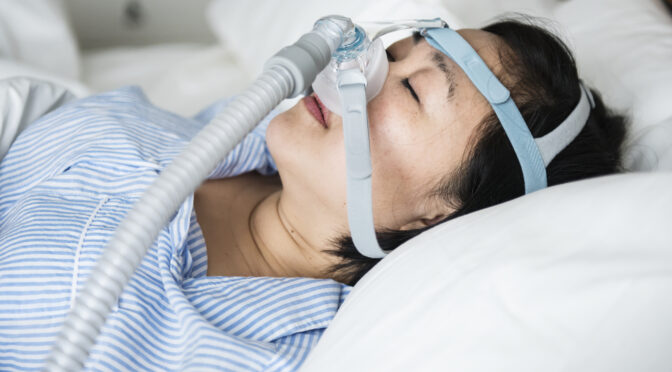Obstructive Sleep Apnea (OSA) is a common but often underdiagnosed sleep disorder that can severely affect your quality of life. It is characterized by repeated interruptions in breathing during sleep, leading to poor rest and numerous health risks. Timely diagnosis of OSA is essential to prevent complications and improve overall health, and one of the most effective ways to identify this condition is through a sleep study. In this blog, we’ll explore how a sleep study helps diagnose Obstructive Sleep Apnea and why early detection is crucial.
What is Obstructive Sleep Apnea?
Obstructive Sleep Apnea occurs when the muscles in the throat relax excessively during sleep, blocking the airway and stopping airflow. These interruptions, known as apnea events, can happen dozens of times per hour, leaving the individual gasping for air and waking up multiple times throughout the night. This cycle not only disrupts sleep but also lowers oxygen levels in the blood, putting a strain on the cardiovascular system.
Common symptoms of OSA include:
- Loud snoring
- Gasping or choking during sleep
- Excessive daytime sleepiness
- Morning headaches
- Difficulty concentrating
Untreated OSA can lead to serious health conditions, including heart disease, high blood pressure, stroke, and diabetes. It can also contribute to fatigue-related accidents due to daytime drowsiness. Early detection through a sleep study is vital to avoid these health risks.
What is a Sleep Study?
A sleep study, or Polysomnography, is a diagnostic tool used to monitor various physiological parameters while you sleep. It is considered the gold standard for diagnosing sleep disorders, including OSA. During a sleep study, healthcare professionals record and analyze several key metrics, such as:
- Brain waves (EEG) to track sleep stages.
- Breathing patterns to identify pauses or irregularities.
- Oxygen levels in the blood.
- Heart rate and blood pressure.
- Muscle activity and eye movements.
There are two main types of sleep studies:
- In-lab sleep study: Conducted at a sleep clinic or hospital, where the patient is monitored overnight by sleep technicians.
- Home sleep study: A simpler version conducted in the comfort of the patient’s home using portable equipment.
Both methods can effectively diagnose OSA, but in-lab sleep studies are generally more comprehensive.
How a Sleep Study Diagnoses Obstructive Sleep Apnea
A sleep study is an invaluable tool for diagnosing OSA because it measures critical data that reveals the severity of the condition. During the study, healthcare providers monitor the number of apnea events that occur. An apnea event is defined as a complete or partial obstruction of the airway that lasts for at least 10 seconds.
One of the key metrics used to evaluate OSA is the Apnea-Hypopnea Index (AHI). The AHI measures the number of apnea (complete blockage) and hypopnea (partial blockage) events per hour of sleep. The AHI score categorizes OSA into:
- Mild OSA: 5-15 events per hour.
- Moderate OSA: 15-30 events per hour.
- Severe OSA: More than 30 events per hour.
The sleep study also provides insight into other related factors, such as oxygen desaturation (drops in blood oxygen levels) and snoring patterns, which help doctors assess how OSA affects your body. Additionally, it helps distinguish between OSA and other sleep disorders like Central Sleep Apnea (CSA), where the brain doesn’t send proper signals to control breathing.
The Importance of Early Diagnosis and Treatment
Leaving Obstructive Sleep Apnea untreated can have severe consequences on your health. Over time, the repeated drops in blood oxygen levels and frequent awakenings during the night can lead to hypertension, arrhythmias, heart attacks, and strokes. Daytime fatigue and drowsiness can also impair concentration and increase the likelihood of accidents.
Early diagnosis through a sleep study is essential to prevent these complications. Once diagnosed, effective treatment options are available to manage OSA and improve sleep quality. Common treatments include:
- Continuous Positive Airway Pressure (CPAP) therapy, which uses a machine to keep the airway open during sleep.
- Lifestyle changes, such as weight loss, quitting smoking, and adjusting sleep positions.
- Surgical interventions, such as Uvulopalatopharyngoplasty (UPPP) or Inspire therapy, for severe cases.
With proper diagnosis and treatment, most people with OSA can enjoy a significantly improved quality of life.
How Apex Pulmonology Can Help You
At Apex Pulmonology, we specialize in diagnosing and treating a wide range of sleep disorders, including Obstructive Sleep Apnea. Our state-of-the-art Sleep Disorder Clinic offers both in-lab and home sleep studies to help identify OSA and other sleep issues. Our experienced pulmonologists and sleep specialists are committed to providing personalized care, ensuring the best possible outcomes for each patient.
If you or someone you know is experiencing symptoms of Obstructive Sleep Apnea, don’t hesitate to reach out. Early diagnosis and treatment are the keys to better sleep and overall health. Contact Apex Pulmonology today to schedule a consultation or sleep study.
Conclusion
Obstructive Sleep Apnea is a serious condition that can have far-reaching effects on your health if left undiagnosed. A sleep study is an essential tool for detecting OSA and understanding the severity of the disorder. With early diagnosis, you can take the necessary steps to treat OSA and improve your quality of life. Don’t wait—if you suspect you have OSA, consider scheduling a sleep study at Apex Pulmonology for expert care and guidance.



